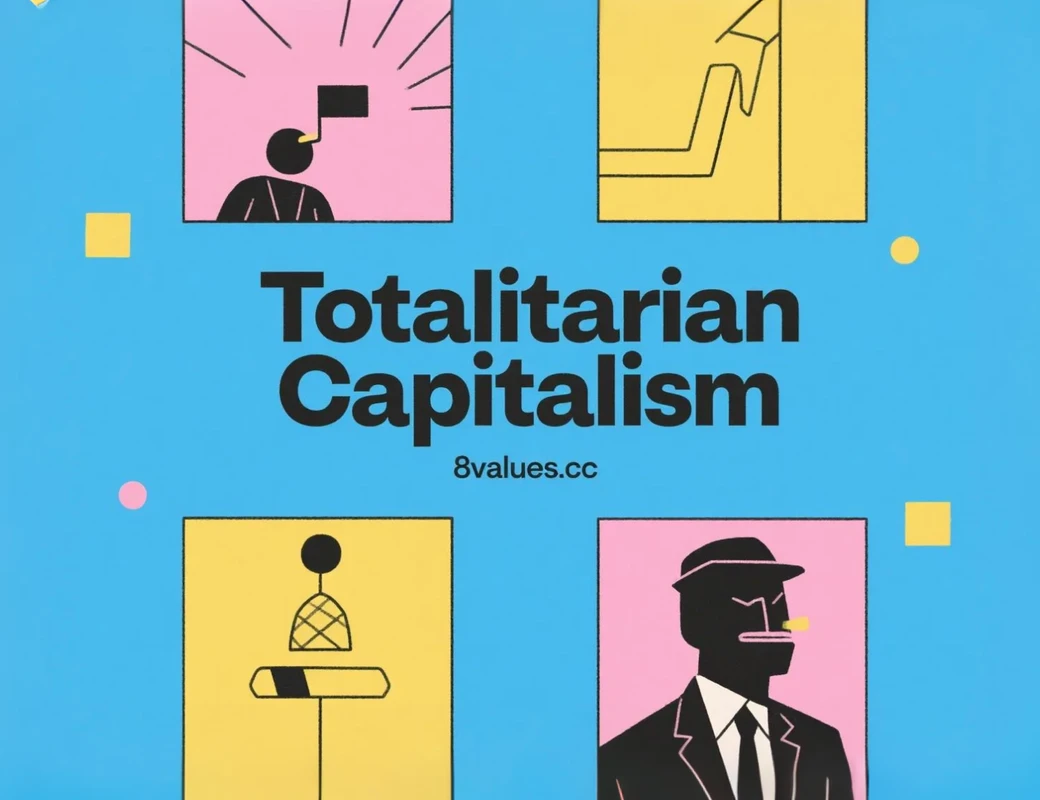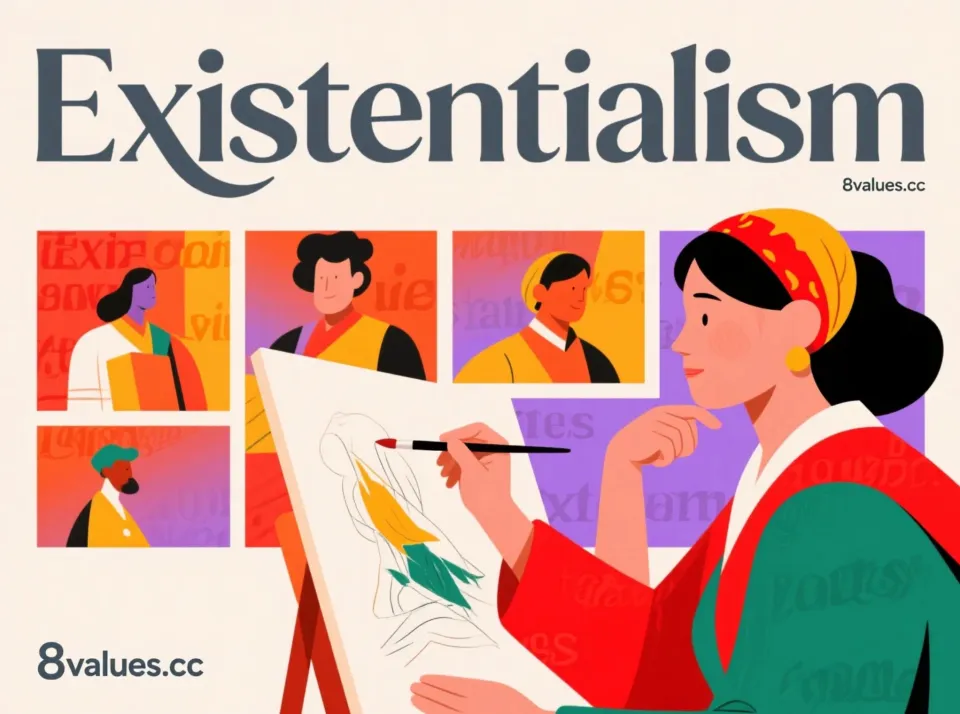Totalitarian Capitalism | 8values Interpretation of ideological ideology of political tests
Deeply explore the controversial political and economic model of "totalitarian capitalism". This article will interpret its core characteristics, historical cases, theoretical critiques in detail, and compare them with concepts such as authoritarian capitalism and state capitalism to help you understand this complex ideology more clearly in the 8values political test.
In today's rapidly changing global political and economic landscape, a thought-provoking and controversial term—"Totalitarian Capitalism"—is gradually entering the public eye and sparking heated discussion. It challenges our understanding of the inherent conflicts in the traditional definition of totalitarianism and capitalism, depicting a complex social form of a state machine seeking to achieve a total control over public and private life while retaining and even leveraging capitalist market mechanisms. This model is not only a theoretical hypothesis, but is also used to analyze the political and economic practices of some countries. Through political tests such as 8values Quiz , we can explore this and more ideological interpretations more deeply.
The core definition and analysis of totalitarian capitalism
"Totalitarian capitalism" is often understood as a combination of political totalitarianism and capitalist market logic . It integrates the extreme characteristics of totalitarian political control with the capitalist economic system, and its core is manifested as a high concentration of capital and political power, and achieves a comprehensive control of economic and social life through a powerful state machine.
However, this concept is not widely accepted in the academic world because it has fundamental contradictions with totalitarianism's definition of state's absolute authority over society and complete control of public and private life, as well as the ideological core ideological conflict of laissez-faire capitalism. Critics believe that "totalitarian capitalism" is an ambivalent rhetoric because capitalism essentially requires market freedom, while totalitarianism excludes free competition.
Nevertheless, this concept is still used as a critical term, warning of the possible extreme fusion of the two forces of “state control and capital pursuit of profit.” It aims to describe a future in which corporate power becomes so dominant that it governs every aspect of life like a totalitarian state controls citizens.
Key Features of Totalitarian Capitalism: The Deep Integration of Power and Capital
The “totalitarian capitalism” model presents a unique set of characteristics that depict the intricate co-conspiracy relationship between power and capital:
- Comprehensive control mechanisms and suppression of objections : Under this system, a single party or leader monopolizes power and eliminates opposition through secret police and surveillance technology. The state has substantially comprehensive control over society, economy, education, art, science, and even private life and civic morality.
- Government intervention and economic monopoly : the state deeply intervenes in market operations in the name of "development" or "national security". This may be manifested as state-owned enterprises-led, mandatory industrial policies or strict supervision of private enterprises. Capital accumulation no longer depends mainly on the free market, but is achieved through political power, such as concentrating economic interests in power groups through franchising and resource monopoly. The market has lost its true freedom, and capital has become a tool of totalitarian stability, rather than a force of checks and balances.
- Formal market and freedom illusion : There are still markets, corporate operations, stock market prosperity and active consumption in name. However, in institutional design, all capital operation must be dependent on power, or even be directly manipulated by power, and market competition is just an illusion. This model retains certain elements of private ownership and market competition, but these mechanisms usually serve the interests of state goals or the ruling elite.
- Elite collusion with capital (nepotism) : There is a close symbiotic relationship between the government and large enterprises or consortiums, forming a kind of "nepotism" in which power and wealth are concentrated in the hands of a few people.
- Instrumentalization of Ideology : Totalitarian capitalism often uses narratives such as nationalism or developmentalism to rationalize economic inequality as "necessary sacrifices" and transfer social contradictions through non-economic compensation (such as social status symbols). In addition, it also creates "soft anesthesia" through the entertainment and consumption culture developed by capitalism, allowing individuals to immerse themselves in it and gradually lose their resistance and critical thinking. This "soft control" allows the ideology itself to be integrated into the production process and instills established attitudes and habits into the audience through consumer goods and services, thereby consolidating the existing order. Herbert Marcuse also deeply analyzes how this "advanced industrial society" can create new forms of social control through technology and consumerism, leading to "one-dimensional people" and "society without objections".
- Technology empowerment control (digital totalitarian) : Modern digital technologies, such as big data monitoring and algorithm management, have become new refined control means. The combination of corporate data monopoly and government power may give birth to "digital totalitarianism." Through algorithms, filter information and quantify social behaviors to achieve invisible control.
- Individual freedom is strictly restricted : Although there may be a certain degree of economic activity, political and social freedoms are often strictly restricted, and governments maintain full control through surveillance, publicity or other means.
Historical Cases and Contemporary Variations of Totalitarian Capitalism
Although the concept of "totalitarian capitalism" itself remains debated, some regimes and trends in history and contemporary times are considered to have similar characteristics:
- Nazi Germany : Once regarded as a typical representative of totalitarianism, its economic policies clearly support capitalism, which only distinguishes "constructive capital" (industry, agriculture) from "predatory capital" (financial/Jewish capital). The Nazi passed the Authorization Act to fully incorporate the economy into state control, forcing enterprises to obey the "four-year plan", and systematically plunder Jewish capital. It abolished trade unions, formed alliances with industrialists, and subsidized the rich and businesses through large-scale military spending, nationalism and racial superiority. Its economic model is considered a kind of non-free capitalism .
- Russia (Putin era) : Sometimes considered to have similar characteristics, states maintain power by controlling key industries (such as energy) and oligarchy economies while retaining some of the market economy characteristics.
- Hungary (Orban Government) : Hungary under Orban's leadership, its "authoritarian shift" and elite consensus revolve around a "accumulative state", which is seen as a form of capitalism that can be deeply authoritarian.
- Singapore : It is regarded as a high-pressure regime by institutions such as Human Rights Watch, lacks freedom of speech, but embraces the core aspects of capitalism and creates an authoritarian capitalist state. The continued feasibility of its economic success is controversial, with some view that its suppression of personal freedom of speech and thought will limit future growth.
- Other cases : The policies of countries such as Turkey (Erdogan), Egypt (Sisi), Brazil (Bolsonaro), India (Modi) and the United States (Trump) are also described by some scholars as "authoritarian developmentalism". They continue to promote the neoliberal global order under the nationalist discourse and use the guise of developmentalism to enhance authoritarianism and deepen neoliberalism.
Theoretical Criticism and Future Prospects of Totalitarian Capitalism
Criticism of “totalitarian capitalism” focuses on its potential negative impact and sustainability issues:
- Contradiction of concepts : As mentioned earlier, some scholars believe that "totalitarian capitalism" is theoretically contradictory, because capitalism's essential requirement for market freedom conflicts with the overall control of totalitarianism.
- Social inequality and abuse of power : Critics believe that this system leads to abuse of power, intensified corruption and social inequality due to the lack of real democratic supervision and free market competition.
- Economic rigidity and innovation suppression : The suppression of innovation and civil society may ultimately lead to economic rigidity and systemic crises, and the case of the collapse of the Soviet Union is often cited to confirm this view.
- "Soft anesthesia" and loss of critical consciousness : Consumerism, entertainment culture and algorithms may immerse people in it, losing critical thinking and ability to resist. Marcuse pointed out that in the "advanced industrial society", society suppresses people's demand for qualitative change by "providing goods" and uses "science to conquer nature" to "science to conquer people."
- Risks of ecological disasters : George Liodakis and George Monbiot linked “totalitarian capitalism” to a serious environmental crisis, believing that its driving force on capital accumulation ignores the limitations of natural regeneration. Slavoj Žižek also stressed that capitalist managers, in accordance with their logic, interpret self-reproduction and environmental consequences as irrelevant to the entire system, leading to potential global ecological disasters.
- Erosion of individual freedom : This model is manifested in economic efficiency, but may erode individual freedom. This trend may intensify in the context of new technologies such as digital monitoring and algorithmic governance.
The concern for the future is that the combination of artificial intelligence, algorithms and monopoly capital may make this system more efficient and harder to shake. Therefore, maintaining market independence and strengthening checks and balances in civil society are the key to resisting such forms.
Comparison of totalitarian capitalism and related political and economic models
To better understand “totalitarian capitalism”, it is necessary to distinguish it from other similar political and economic models:
- Totalitarianism : Traditional totalitarianism emphasizes the state's overall control over everything, and the economic possibility of implementing a planned economy. Totalitarian capitalism retains the appearance and efficiency tools of capitalism economically, but is the logic of totalitarianism politically and socially - capital becomes an extension of totalitarianism, not a force of checks and balances . Typical examples of totalitarianism are Nazi Germany, fascist countries, and the Soviet Union.
- Authoritarian Capitalism : Authoritarian capitalism (or "non-free capitalism") refers to a capitalist country that coexists with political autocracy and economic openness under an authoritarian regime. It retains some economic freedom, but it is different from totalitarian “political absolute control”. Totalitarian capitalism can be seen as an extreme manifestation of authoritarianism, which means a total control over social public and private life, and authoritarianism may leave greater room for activity in the private sphere.
- State Capitalism : State capitalism refers to the model in which the state plays a leading role in the economy but still retains the capitalist elements economically. It often overlaps with authoritarian capitalism. In state capitalism, states conduct business activities, but may not pursue a comprehensive ideological control over citizens’ private lives like totalitarian capitalism.
- With Liberal Capitalism : Liberal Capitalism emphasizes market freedom and individual rights, and government intervention is less. This is in sharp contrast to the control of totalitarian capitalism.
- With Socialism : Socialism usually aims to eliminate private ownership, although it may also involve government control; while totalitarian capitalism retains private ownership, although this private ownership is strictly controlled.
- Totalitarian capitalism and fascism have certain similarities in state control and nationalism. But fascism emphasizes more on ideological unity and militarization, while totalitarian capitalism focuses more on economic control.
Summary: Understand the complex world and explore multiple possibilities
"Totalitarian capitalism" as a critical concept prompts us to reexamine the possible concentration of power that globalization, neoliberalism, and technological developments. It reminds us that in the absence of democratic checks and balances, capitalism may slide toward authoritarian, or even more extreme modes of control.
When exploring various political ideologies in the 8values political test , the understanding of “totalitarian capitalism” helps us identify and analyze the complex and changeable real world. It warns us that behind the superficial economic efficiency and prosperity, there may be a profound erosion of individual freedom and critical spirit. Therefore, for any society that pursues freedom and justice, it is particularly important to be vigilant against the complicity between power and capital and actively seek mechanisms of balance and checks and balances. By thinking deeply about these concepts, we can better understand the challenges facing human society and contribute our own strength to building a more just, free and sustainable future.
To learn more about ideological and political stances, visit the 8 values blog and ideological list for more exciting content.






